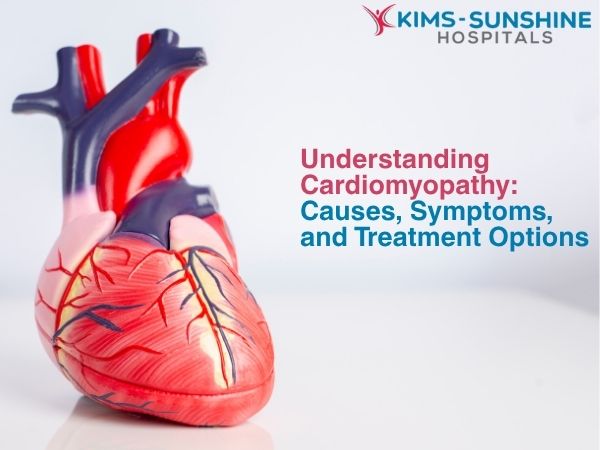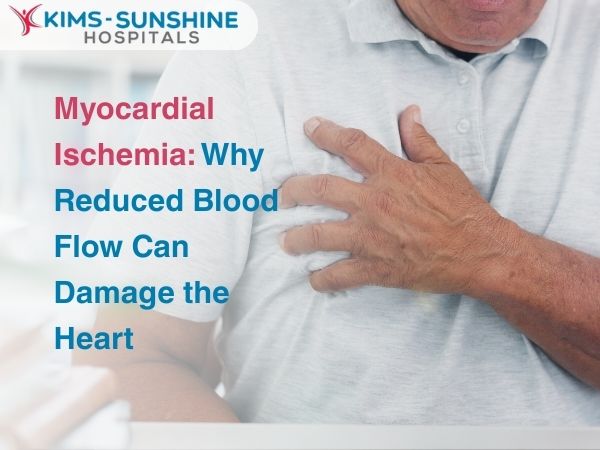
Understanding Cardiomyopathy: Causes, Symptoms, and Treatment Options
 Cardiomyopathy is a group of heart related disorders where the heart muscles get enlarged and are hence not able to function at their normal levels. It is a condition that develops slowly, but surely. Many people remain asymptomatic most of the time, which is why it is a dangerous condition to deal with. Continuing, untreated cardiomyopathy can lead to heart failure. There are different kinds of cardiomyopathy- hypertrophic, restrictive and dilated hypertrophy respectively, along with others caused by specific triggers like stress, ischemia, alcohol, chemotherapy, etc. Pregnant women are at danger of developing postpartum cardiomyopathy (PPCM) too. Dilated hypertrophy is the most common condition in India, while all hypertrophy cases come up to about 22 million cases in total, with an annual incidence of about 1.2 million cases per year. Cardiomyopathy may also occur due to autoimmune disease, diabetes etc., while at other times, it is hard to pinpoint the exact cause.
Cardiomyopathy is a group of heart related disorders where the heart muscles get enlarged and are hence not able to function at their normal levels. It is a condition that develops slowly, but surely. Many people remain asymptomatic most of the time, which is why it is a dangerous condition to deal with. Continuing, untreated cardiomyopathy can lead to heart failure. There are different kinds of cardiomyopathy- hypertrophic, restrictive and dilated hypertrophy respectively, along with others caused by specific triggers like stress, ischemia, alcohol, chemotherapy, etc. Pregnant women are at danger of developing postpartum cardiomyopathy (PPCM) too. Dilated hypertrophy is the most common condition in India, while all hypertrophy cases come up to about 22 million cases in total, with an annual incidence of about 1.2 million cases per year. Cardiomyopathy may also occur due to autoimmune disease, diabetes etc., while at other times, it is hard to pinpoint the exact cause.
What Are The Early Signs Of Cardiomyopathy In Adults?
Some of the earliest symptoms include heart palpitations, chest pain, swelling in the limbs – especially the ankles due to fluid retention, shortness of breath, feeling dizzy and feeling like you may faint, along with high levels of fatigue, respectively.
Difference Between Dilated And Hypertrophic Cardiomyopathy-
Dilated CM is a condition where the heart chambers dilate or become larger in size – causing them to weaken gradually. Hypertrophy is a condition where the muscles of the heart get thicker over time, affecting their ability to beat normally. In both cases, the functionality of the heart gets affected and there is heart failure as an end result.
How Is Cardiomyopathy Diagnosed And Treated?
A detailed medical history is taken, after which you may be asked to take any of the tests listed below-
- Blood tests
- Cardiac CT, Chest X-Rays or Heart MRI – Imaging techniques
- ECG or EKG to check for electrical activity, blood flow with Doppler ultrasound.
- A myocardial biopsy may be taken in some cases
- A cardiac catheterisation test where a catheter is inserted into your arteries to check blood flow to and from the heart
- A stress test to check for changes in heart rate and rhythm due to exercise.
Natural Remedies To Manage Cardiomyopathy Symptoms-
A heart friendly diet in the long run will benefit you immensely, especially if you suffer from cardiomyopathy or other heart related disorders. Some of the best measures you can take include-
- Controlling sodium intake on a daily basis by watching what you eat throughout the day.
- Paying attention to your weight, blood pressure and managing comorbidities like diabetes.
- Exercising regularly
- Sleeping enough and everyday.
- Finding ways to destress effectively.
- Not drinking alcohol or smoking.
Cardiomyopathy can be treated with drugs like blood thinners, antihypertensives, antiarrhythmics, medications that help reduce cholesterol levels in the blood, hormone antagonists for aldosterone or corticosteroids in some instances. Surgery may also be done for advanced hypertrophy- like the use of pacemakers and defibrillators which may be implanted in the body. Other times call for the usage of certain devices that help blood flow better – like an LVAD or CRT respectively.
Conclusion
Living with cardiomyopathy can be challenging and life expectancy related questions may arise. Dilated hypertrophy is the main issue in such cases, leading to premature heart failure and causing lower life expectancy, when compared to other cardiomyopathies. Most other cases can be managed with changes in lifestyle and taking medication in the proper doses. Treatment is mostly done based on what the cause of the hypertrophy is, how severe your symptoms are and how well you respond to treatment when done.Your overall health also matters.






